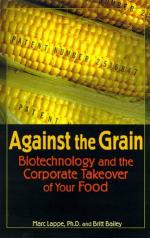|
This section contains 1,520 words (approx. 6 pages at 300 words per page) |

|
Biotechnology is the use of organisms or their parts or products to provide a valuable substance or process. Fermentation using microorganisms in brewing, baking, and cheese production are biotechnologies that date back centuries. Production of human insulin in bacteria to treat type I diabetes mellitus without causing allergic reactions is a more modern example of biotechnology. Two widely used biotechnologies that manipulate genes are recombinant DNA technology, which endows single-celled organisms with novel characteristics using genes from other organisms, and transgenic technology, which creates multicellular organisms that bear genes from other types of organisms. Genetically modified (GM) fruits and vegetables, such as a type of corn that manufactures a bacterial insecticide, are transgenic plants.
Ethical issues that arise from modern biotechnologies include the availability and use of privileged information, potential for ecological harm, access to new drugs and treatments, and the idea of interfering...
|
This section contains 1,520 words (approx. 6 pages at 300 words per page) |

|


